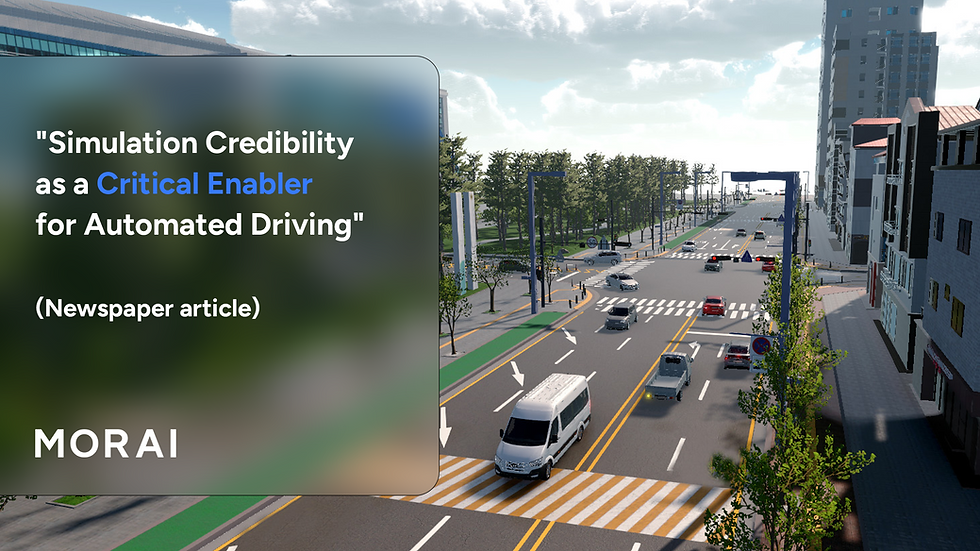Automotive simulation platform MORAI secures $20.8M Series B to expand its global footprint
- ublim3
- Feb 8, 2022
- 2 min read
Updated: Oct 9, 2025
Source: TechCrunch
Automotive simulation platform MORAI secures $20.8M Series B to expand its global footprint

Digital Twin Environment developed by MORAI SIM – Duluth, MN
MORAI, which provides autonomous vehicle developers with automotive simulation tools to verify the safety and reliability of self-driving systems, announced today it has raised $20.8 million (25 billion KRW) in a Series B funding round as it wants to increase its global presence, specifically into the U.S., Germany, Japan and Singapore.
The fresh capital was led by Korea Investment Partners along with KB Investment and Korea Development Bank. Existing investors Naver D2 Startup Factory, Hyundai Motor Group, Kakao Ventures and Atinum Investment also participated in the round. It brings its total funding raised to date to $24.9 million (30 billion KRW).
The South Korea-headquartered startup, which has 84 employees, will also use the proceeds to double its headcount worldwide by the end of this year, CEO of MORAI Jiwon Jung told TechCrunch.
Three co-founders, Jung, Jun Hong and Sugwan Lee, founded the company in 2018 to build autonomous driving simulation platforms that let autonomous vehicle manufacturers simulate real-world test driving.
Many autonomous vehicle companies use repetitive simulation tests to prove safety and reliability for their self-driving vehicle validation.
MORAI’s simulator solution, called MORAI SIM, gives users a variety of virtual testing scenarios with its high-definition (HD) map-based 3D simulation environments. One of MORAI’s most unique features is its large-scale simulation platforms enabled by digital twin technology, a digital replica of an object in the physical world, co-founder and CTO of MORAI Hong told TechCrunch. MORAI SIM already replicated more than 20 cities across the globe.
In January at CES 2022, MORAI unveiled the software-as-a-service (SaaS) model of its MORAI SIM, also known as MORAI SIM Cloud, which allows users to perform simulation tests in the cloud without the process of installing any software onto their local computers. As a result, users can test an AV driver against myriad simulation environments, regardless of the hardware they operate on.

Digital Twin Environment developed by MORAI SIM – Las Vegas, NV
MORAI serves more than 100 corporate clients, including Hyundai Mobis, Hyundai AutoEver, Naver Labs and 42dot, and research institutions Korea Advanced Institute of Science and Technology (KAIST), Korea Automotive Technology Institute (KATECH) and the Korean Transportation Safety Authority. It also has created partnerships with an array of global companies like NVIDIA, Ansys and dSPACE.
Jung said that the company has considerable growth potential because its simulation platforms can be applied to autonomous driving and other areas like urban air mobility (UAM), logistics and smart cities.
The startup posted $1.7 million of revenue in 2021, increasing at a 226% compound annual growth rate (CAGR) from 2018 through 2021. Last year, MORAI set up its U.S. office in San Francisco.
“We will direct all our energy into sharpening our technological edge to further enhance our global competitiveness in the autonomous vehicle simulation platform,” Jung said.
“MORAI’s simulator technology is projected to play a critical role in enhancing the safety and functionality of self-driving cars,” said KunHo Kim, executive director of Korea Investment Partners. “We expect to see the continued growth of the company since it has potential to lead the autonomous driving market not only in Korea but globally.”


